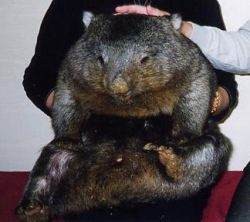Wombats, particularly their young, possess an undeniable charm that can make anyone fall in love. Their cuddly appearance and seemingly affectionate nature might lead you to ponder, “Can You Have A Wombat As A Pet In Australia?” While the image of a pet wombat might be appealing, the reality is quite different. It’s crucial to understand that despite their initial cuteness, wombats are wild animals, not domesticated pets, and keeping them as such is not only impractical but also illegal in most parts of Australia.
 Bare-nosed wombat interacting with a human, illustrating why wombats are not suitable pets in Australia
Bare-nosed wombat interacting with a human, illustrating why wombats are not suitable pets in Australia
Why Wombats Are Not Suitable Pets
Firstly, in most regions of Australia, wombats are protected native animals. This protection means it is against the law to keep them as pets without proper permits, which are typically only granted to licensed wildlife carers. Wombats are wild creatures with specific needs that cannot be met in a typical domestic environment. They require specialized diets and care that are far from ordinary pet ownership.
Beyond legalities and care complexities, consider their natural behaviors. Wombats are incredibly strong animals and can be remarkably destructive. Their powerful digging abilities and sheer strength mean they can easily damage fences, doors, and even walls in their pursuit of exploration or simply following their natural instincts. Concrete and steel are often cited as the only truly wombat-proof materials.
Furthermore, while young wombats might appear docile and friendly, this can change dramatically as they mature. Adult wombats can become aggressive, territorial, and unpredictable. They possess considerable strength and speed, making them potentially dangerous if they feel threatened or stressed. This inherent wildness and potential for aggression are significant reasons why they are not safe or suitable as household pets.
Caring for Orphaned Wombats and Supporting Conservation
It’s important to distinguish between keeping a wombat as a pet and caring for orphaned or injured wombats. Dedicated and trained wildlife carers play a vital role in rescuing and rehabilitating native animals, including wombats. These carers are authorized to provide temporary care, often to orphaned young, with the ultimate goal of releasing them back into their natural habitat once they are capable of independent survival. This is not pet ownership; it’s wildlife rehabilitation.
If your interest in wombats stems from a place of care and concern, there are numerous constructive ways to help. Supporting reputable charitable organizations dedicated to native animal conservation, such as the Native Animal Network Association, is a significant contribution. You could also explore becoming a registered wombat carer yourself, which involves training and licensing to ensure you can provide appropriate care under professional guidance. For those who wish to support wombat welfare without the responsibilities of caring for a live animal, virtual wombat adoption programs offer a fantastic alternative, allowing you to contribute to their well-being in the wild.
Conclusion: Wild Wombats Belong in the Wild
In conclusion, while the allure of having a unique pet like a wombat is understandable, it is simply not a responsible or legal option in Australia. Wombats are wild animals that belong in their natural environment. Keeping them as pets is detrimental to their well-being and potentially dangerous. Instead, we should focus on respecting their wild nature and supporting their conservation through ethical and responsible actions. Let wombats thrive in the wild, and explore alternative ways to connect with and support these fascinating native creatures.